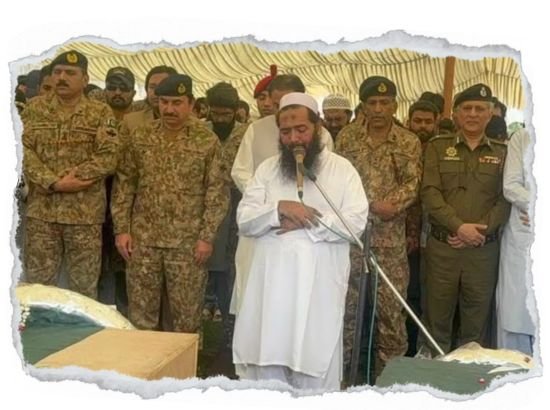
In the wake of Operation Sindoor, the Indian Army has released a list identifying top Pakistani military and police officials who were seen mourning at the funerals of slain terrorists. This move follows a major counter-terror operation by India in response to the Pahalgam attack, which reportedly resulted in the deaths of at least 100 Pakistani terrorists.
Videos and images circulated on social media show uniformed Pakistani officers participating in the last rites of terrorists, many of whom were eliminated in precision strikes carried out by Indian forces. The funerals were held in Pakistan’s Punjab province, where these terrorists were laid to rest with full military honors — a gesture that India has strongly condemned.
According to the list issued by the Indian Army, those present at the funerals include Lahore IV Corps Commander Lt. General Fayaz Hussain Shah, 11th Infantry Battalion’s Major General Rao Imran Sartaj, Brigadier Muhammad Furqan Shabbir, Punjab Police Inspector General Dr. Usman Anwar, and Punjab Assembly member Malik Shoaib Ahmad.
India’s actions, which targeted key terrorist infrastructure in Pakistan and Pakistan-occupied Kashmir (PoK), have drawn international attention. Among the nine terrorist camps struck were locations in Muridke, Kotli, Bahawalpur, and Bhimber. Muridke is known as the headquarters of Lashkar-e-Taiba, while Bahawalpur has long been a base for Jaish-e-Mohammed.
India also targeted terrorist hideouts in locations such as Sawan Nala, Sarjal, Kotli Gulpur, and Mahmoona Joa. Four of these were in mainland Pakistan, while five were in PoK. The Indian Army released satellite imagery and other evidence showing that high-value targets were eliminated during the mission.
Despite Pakistan’s denial on global platforms of harboring terrorists, the reality, India asserts, has been exposed once again. New Delhi has pointed to the participation of state officials in the funerals as evidence of official support for terror networks operating from Pakistani soil.
One video even captured Hafiz Abdul Rauf, a senior leader of Lashkar-e-Taiba and a U.S.-designated terrorist, mourning at the funerals. Coffins draped in Pakistani flags were carried on the shoulders of uniformed army personnel — a sight that raised questions about Pakistan’s claim that only civilians were affected in the Indian strikes.
India has rejected Pakistan’s claim that innocent civilians were killed. Indian Foreign Secretary Vikram Misri presented photographic evidence to the international community, asking pointedly: “Are civilians normally buried with military honors and the national flag?”
After the Indian operation, tensions escalated rapidly, with Pakistan launching missile and drone attacks in retaliation. However, within 48 hours, Islamabad reportedly sought a ceasefire following India’s forceful response. The de-escalation was facilitated by U.S. intervention, particularly from former President Donald Trump, who reportedly helped broker a temporary truce between the two nuclear-armed nations.
India’s latest disclosures have further intensified the diplomatic spotlight on Pakistan’s duplicity. By showcasing the mourning presence of top officials at terrorist funerals, India aims to underline what it describes as Pakistan’s continued state-sponsored support for cross-border terrorism.